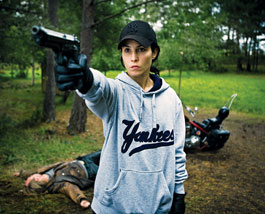home | metro santa cruz index | film review

DIEHARD FAN: Noomi Rapace's Lisbeth Salander brings the heat in 'The Girl Who Played With Fire.'
The Avenger
Men get what's coming to them at the hands of Lisbeth Salander in 'The Girl Who Played With Fire'
By Richard von Busack
LISBETH Salander is back. That fact may be more important than the sometimes eyebrow-raising plot of The Girl Who Played With Fire. At a certain point, Hitchcock's Excuse ("Nobody calls the police, because it wouldn't be fun if they did") can only go so far.
This second installment in the Stieg Larsson series brings back Noomi Rapace's ratty but invincible urchin: 80 pounds, 5 feet tall, black-dyed hair, wardrobe by CBGB. She's been sorting out the people who have wronged her since she was age 12. (The film's sick-joke title refers to the crime that sent her up the river: barbecuing her abusive father with a can of gasoline and a match.)
Salander is armed with brilliant computer hacker skills, a pistol and a stun gun, the last of which she uses on many pairs of deserving bollocks. That this movie has tendency toward bollockisms isn't quite her fault.
This time, Lisbeth comes back from her wealthy exile and tries to reconnect with her old life, first dropping in to call up the mysterious girl (Yasmine Garbi) she was found sleeping with in The Girl With the Dragon Tattoo. Shortly after Lisbeth's return to Stockholm, her old nemesis (and rapist) of a parole officer starts stirring up trouble; this, despite the efficient way Lisbeth handled him in the last movie. Rape-revenge films are a little too basic for me, but one has to admire Lisbeth's skill with a dildo and a tattoo gun.
Meanwhile, trustworthily pockmarked investigative journalist Mikael (Michael Nyqvist) meets a new young writer working for Millennium magazine. He and his sociologist girlfriend are trying to expose the sex-slave trade conducted out of the former Soviet Union, apparently abetted by the Sapo, the Swedish Secret Police. Both the young writer and his girlfriend are soon liquidated. The authorities suspect Lisbeth of the killings, and she must go on the run to find the real culprits.
It all comes together with help from the ever-clutching Hand of Coincidence. Director Daniel Alfredsen is trying to create a Euro-answer to Americanized thrillers by gentling them with humanism. We pause to see Mikael shaking his heavy head over every dead body, and stoutly maintaining that Lisbeth is not a killer.
Match this with the kind of sexual politics unseen since the 1970s in film; ornery even before she was raped, Salander is an old-fashioned pulp heroine in a pulp plot. Her opponents are thoroughly dirty: a hulking henchman whose strange medical condition makes him analogous to one of the minor 007 villains (hint, The World Is Not Enough).
The muscleman's boss is a scar-faced head villain "who speaks six languages fluently" even if he should have smarter hiring practices. When you try to dispatch a pair of heroes by locking them in a barn and setting it on fire, it's not because that's a lethally efficient way of killing someone. It's because everyone wants to see a barn burning.
No one can say they haven't seen this movie before, they just haven't seen it in Swedish before. Some fibrillating vistas of Stockholm in the summer gloaming make that city look like nothing but waterfront property. When we get surfeited with these shots, the action switches to the maritime city of Goteborg, where the skies are more appealingly melancholy. Even the car chases feature spotless new vehicles climbing curbs and running down sidewalks you could eat off of.
Oddly, this series about the stodginess of Sweden, about police skullduggery and about savage, racist, rapacious patriarchs sitting on the chest of the modern nation, is also a feature-length postcard for the country. Maybe Sweden wouldn't be attractive to tourists unless it seemed a little dangerous? Yet Peter Mokrosinski's cinematography exemplifies a current trend: what Todd Miro's Into the Abyss blog describes as "that color-grading virus that is teal and orange." We probably can't stop them from digitally intermediating every film until it's almost duotone blue and gold, but at least we can make them self-conscious about it.
THE GIRL WHO PLAYED WITH FIRE (Unrated; 129 min., with subtitles), starring Noomi Rapace, opens Friday at the Nickelodeon.
Send letters to the editor here.
|
|
|
|
|
|